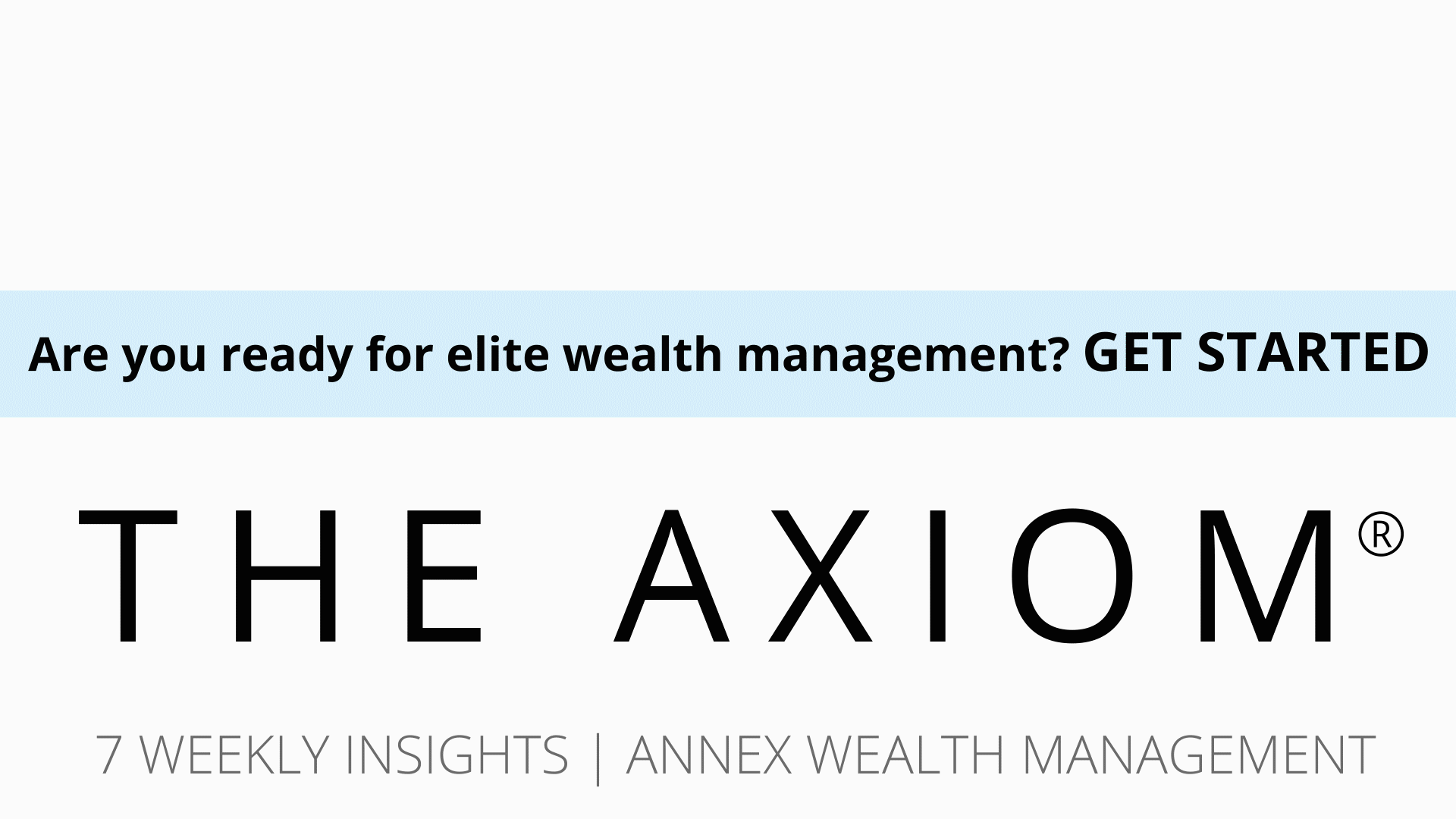
Axiom | Vol 264
Growth Of FAANG Stocks Helps Mask Some Selling Activity

Meet The Axiom®’s Guest Editor: Cathy Lange
Hi, I’m Cathy Lange, a Compliance Specialist at Annex Wealth Management.
My role involves reviewing materials for compliance and keeping up to date on regulatory requirements. I am happy that my role also includes interaction with my team, other associates in the firm and with our clients.
My husband Jeff and I are empty nesters and enjoy spending time with our two daughters, traveling, outdoor sports and taking advantage of all the activities our state offers.
BACK TO TOP ↑

Growth Of FAANG Stocks Helps Mask Some Selling Activity
Since May, 8 stocks have been responsible for over half of the growth of the S&P 500. Annex Wealth Management’s Mark Beck and Derek Felske discuss why now may be a very prudent time to look at rebalancing your investments.
BACK TO TOP ↑

In a recent radio segment, Annex Wealth Management’s Brandon Lehman, CFP®️ helps separate fact from fiction when it comes to millionaires.
Poll: How Many Of These Myths Do You Agree With?
BACK TO TOP ↑

“My favorite part of the Axiom is the MoneyDo because there is something for everyone in this section. I especially like the estate planning tips, such as considering a basic estate plan for young adults to reminders to review your own plan periodically.”
– Guest Editor:
Cathy Lange | Compliance Specialist
________________________________________
Consider A Roth Conversion
Some savers approaching retirement have managed to amass a significant nest egg in retirement accounts. Commonly, the money was saved on a traditional or pre-tax basis, which means that the money contributed has never been taxed. The upside of this strategy is that a tax deduction received up front can be very beneficial. The downside is that now, the saver faces the responsibility of unwinding these funds in the most tax-efficient manner.
Many find themselves in a higher tax bracket during working years and lower during retirement years – a good example where saving pre-tax can make sense. Saving pre-tax is especially true if we’ve reached our peak earning years in the middle and end of our working career. Those peak years could be the ideal time to get a tax deduction with every dollar saved, while waiting until retirement to withdraw these funds in a lower tax bracket.
Think about your situation. Have you saved money on a pre-tax basis? If so, in this week’s edition of the Money Do, we encourage you to explore a similar and related strategy. Consider if it makes sense to strategically withdraw money from your traditional retirement account and convert those dollars to a Roth IRA. This strategy is called a Roth conversion.
Roth IRAs are funded with after-tax dollars, which means the contributions are not tax-deductible. However, if a Roth approach is implemented correctly, all future growth in the Roth account is tax free and no tax is due when funds are withdrawn. We therefore suggest that you consider the benefits and drawbacks of a Roth IRA, and the impact it could have on your tax situation.
BENEFITS OF A ROTH IRA
- Funds in a Roth IRA can generally be withdrawn free of income tax, if you follow the rules
- A Roth IRA is a tax-free “bucket” of savings which offers tax diversification throughout retirement
- Roth IRAs aren’t subject to required minimum distributions
- Roth assets provide insulation against increases in future tax rates by paying the tax now
- Given the economic and political environment, many believe our country may see increased income tax rates in the future
DRAWBACKS OF A ROTH IRA
- Taxes must be paid up front
- You must navigate complex rules to ensure that the funds can be withdrawn tax free (but don’t worry, a financial professional can help)
- Undertaking a Roth conversion without expert planning can lead to tripping tax thresholds which can result in unexpected, increased taxation
WHEN IT MAKES SENSE TO CONVERT TO A ROTH IRA
- Lower income years, such as extended periods between jobs
- Generally, after retirement but before required minimum distributions begin
Essentially, a Roth conversion is a tax management technique. The overall idea is to save money in a tax deferred retirement plan when income is high and convert it to a Roth IRA in years when income is low, creating tax efficiency in your financial plan. If passing wealth to the next generation in a tax-efficient manner is important to you, Roth conversions may be a strategy to explore.
Although you may be able to handle a Roth conversion yourself, we suggest consulting an advisor you can trust. There are many intricate factors to consider. A competent, fee-only financial planner can help evaluate if this strategy is right for you.
BACK TO TOP ↑

This week’s Ask Annex comes from Michael, who asks:
“What do you know about the new tax cut and how will it affect me?“
___________________________
We asked Annex Wealth Management’s Eric Strom, CFP®:
BACK TO TOP ↑

Does Your Advisor Create Insights For You To Listen To & Share In Your Car?
Check out Annex’s Know The Difference Minute™ on Spotify.
BACK TO TOP ↑


KNOW THE DIFFERENCE MINUTE:
Online Scammers Using Facebook, Instagram, WhatsApp, Tinder
KNOW THE DIFFERENCE MINUTE:
Apple / Goldman Sachs Partnership
ANNEX RADIO
Rollover Mistakes To Avoid
BACK TO TOP ↑

Annex Wealth Management provides free workshops, open to the public, on key wealth management topics.
Each week, we provide links to register for upcoming events.
BACK TO TOP ↑